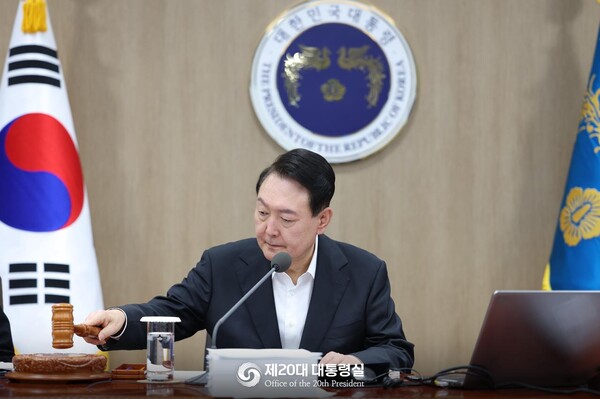Amid an expected downturn in Korea's export with the slowdown in the global economy, the Yoon Suk Yeol administration is looking to find avenues for exports by revitalizing the bio-health industry.

At an emergency economic ministerial meeting, the Ministry of Health and Welfare jointly announced the "Strategic Plan for Export Revitalization of the Biohealth Industry" with related ministries.
This export revitalization strategy plan is a follow-up to a biohealth new market creation strategy announced in February and refines the export revitalization strategy for the biohealth industry this year based on analyzing the export status of drugs and medical devices before and after Covid-19.
The main contents of the strategy are divided into three parts – securing biopharmaceutical production capacity, developing innovative new drugs, and fostering professionals.
To secure the biopharmaceutical production capacity, the government is promoting the creation of a large-scale fund to support global clinical trials and devising a plan to provide incentives based on inter-ministerial cooperation to accelerate Korean companies' investment in production facilities.
As a result, the government plans to raise 500 billion won ($387.1 million) to form a K-Bio Vaccine Fund by the first half of 2023 and raise an additional 1 trillion won by 2025.
To develop innovative new drugs, the government will invest 2.2 trillion won through the National New Drug Development Project until 2030, while actively supporting open innovation between bio-ventures and overseas pharmaceutical companies.
To respond to the expanding global demand for biopharmaceuticals and ensure excellent quality, the government also aims to train skilled and specialized production personnel who can be immediately put into the field.
The government expects that the training centers planned by the Korea National Institute for Bioprocessing Research and Training and the Biopharmaceutical Production Specialist Training Center, which will open in 2025, will be able to train 4,000 people a year.
In addition, two good manufacturing practice (GMP) training facilities, specializing in vaccines, which will be located in Andong, North Gyeongsang Province, and Hwasun, South Jeolla Province, will be able to train 600 people a year when they officially open in 2026.
To support the development of overseas sales of Korean medicines, the government will enhance its government-to-government (G2G) and regulatory response capabilities to reduce export barriers and provide information on public procurement markets.
The government also plans to establish a network with the U.S. Healthcare Distribution Alliance, which accounts for 90 percent of the U.S. distribution market.
The government will also increase the number of companies in the Cambridge Innovation Center in Boston to the current 20 to 30 by next year.
Aside from the U.S., government officials will establish new offices and support participation in major pharmaceutical exhibitions to promote local partners and technology collaboration and add Singapore to the list of GMP mutual recognition countries for exported pharmaceutical products.
The government also plans to establish a one-stop support system for exports by setting up a one-stop comprehensive support center for biopharmaceutical exports to expand professional consulting support from pharmaceutical experts.
The center will also strengthen full-cycle export support services by providing information on global regulations and industry trends.
"The biohealth industry is a key industry for future growth, with exports expected to increase this year even during a global recession," Health and Welfare Minister Cho Kyoo-hong said. "Despite the expected deterioration in export conditions, we will mobilize our policy capabilities to help the biohealth industry play a leading role in expanding Korean exports based on our competitiveness confirmed during the Covid-19 pandemic."
Related articles
- Yoon pictures a Korean version of Boston biotech cluster
- President Yoon orders expansion of 24-hour pediatric emergency care system
- [Reporter's Notebook] Lost are the government's bio-industry promotion policies for 2023
- Korea wants to be top 5 medical device exporter by 2027
- President Yoon's US visit shines a spotlight on 21 pharma, biotech firms: A detailed analysis
- Can open innovation, R&D tax support produce Korea’s next blockbuster drug?

